Let’s build a mission for a 20 year old project, whose declared vision is to “democratise publishing”.
Before we can dive in, let’s take a closer look at what we’re really trying to achieve: when will we call it a day and say we’re done? Ideally, that is when publishing is democratic, right?
On the WordPress about page we see that the mission of WordPress is basically describing what WordPress aspires to be. Included in that description is the idea of democratising publishing, which sounds more like a value in that context (a.k.a. something we believe in).
I believe that the real, grandiose, high aiming, long term impressive outcome, a.k.a. vision, of this long running project, WordPress, is in fact democratising publishing.
Democratising publishing is not a mere value, nor is it our mission, it is our vision.
Democratising publishing. But how?
Well, let’s run with the idea that WordPress has the vision to democratise publishing. That makes “publishing” the market of WordPress and by democratising it WordPress is constantly creating more market, bringing publishing to more and more people.
As a strategy, we are are going for a strategy of becoming the OS of the Web. Becoming the OS of the Web, it’s just a means to an end, it is not a visionary explanation how WordPress will democratise publishing. Therefore it’s a mere strategy. It is not a Mission to complete our Vision. So, to me it seems that WordPress is lacking a mission that explains the how.
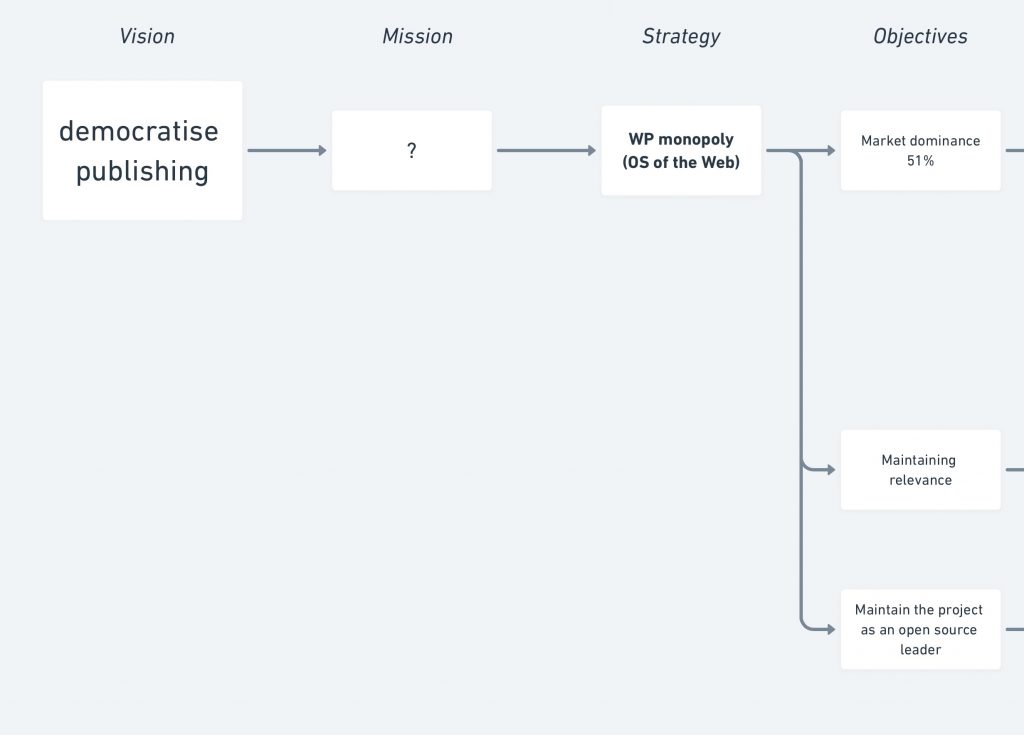
Based on the mission, we should derrive strategies that will enable it to actually occur in reality. Having a mission allows the strategies to be varied and to have predictabilities compared to when they exist in a void, unthetered to a superior aspect.
Making a mission for WordPress is a complex business. I appreciate that having a mission, in a large, “late stage” open source project could be very restrictive. It would bring a lot more rigidity in decisions, and also potentially make some of these decisions hard to explain. Therefore let’s continue based solely on our Vision.
Democratise publishing. How do we make that happen?
The one strategy we have (OS of the Web) results in objectives and we have plenty of those:
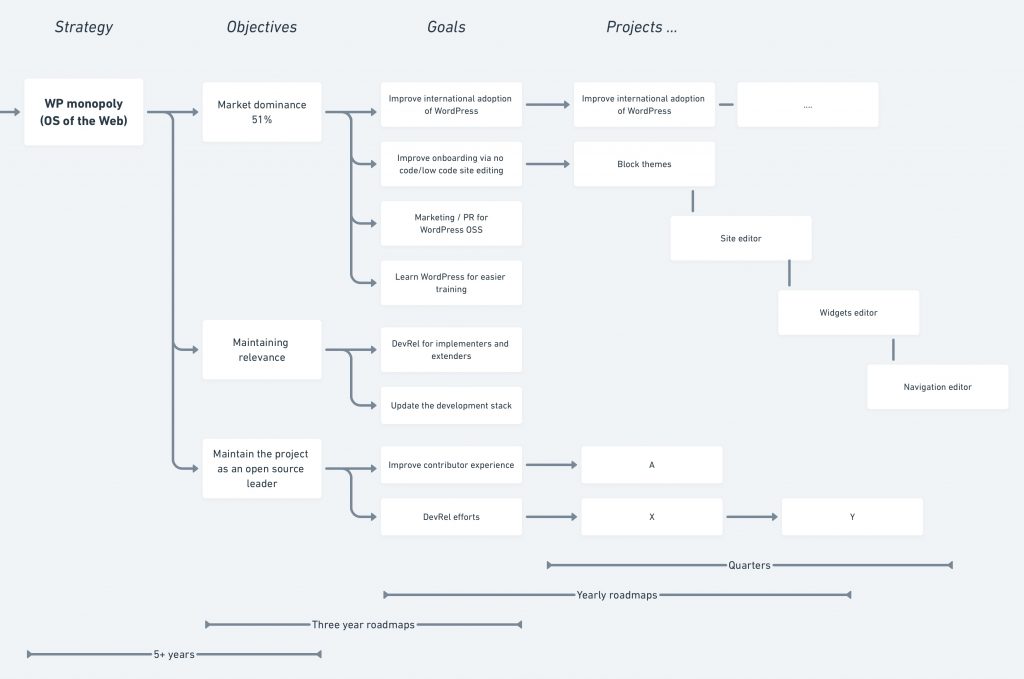
The problem is, however, that we need some checks on strategy to make sure we pick the right objectives. Lacking that previous item before a strategy, a mission, the objectives are all great as long as they advance the strategy. But what if they hurt the Vision? Objectives in turn generate goals, and we also have plenty of those, not to mention the projects.
The strategy we’re currently focused on, becoming the operating system of the web, is a viable strategy. What is missing is a description of:
- how exactly it is going to allow WordPress to democratise Publishing and,
- what risks does this monopoly strategy pose for the (missing) Mission and ultimately the Vision we have?
Knowing the risks of this particular strategy is different to general threats (competition, technology, changing market landscape). These risks are owned by WordPress itself, and in turn they influence our quarterly achievements and the roadmaps (yearly, three years and 5+) we make: we should make roadmaps to minimize those risks.
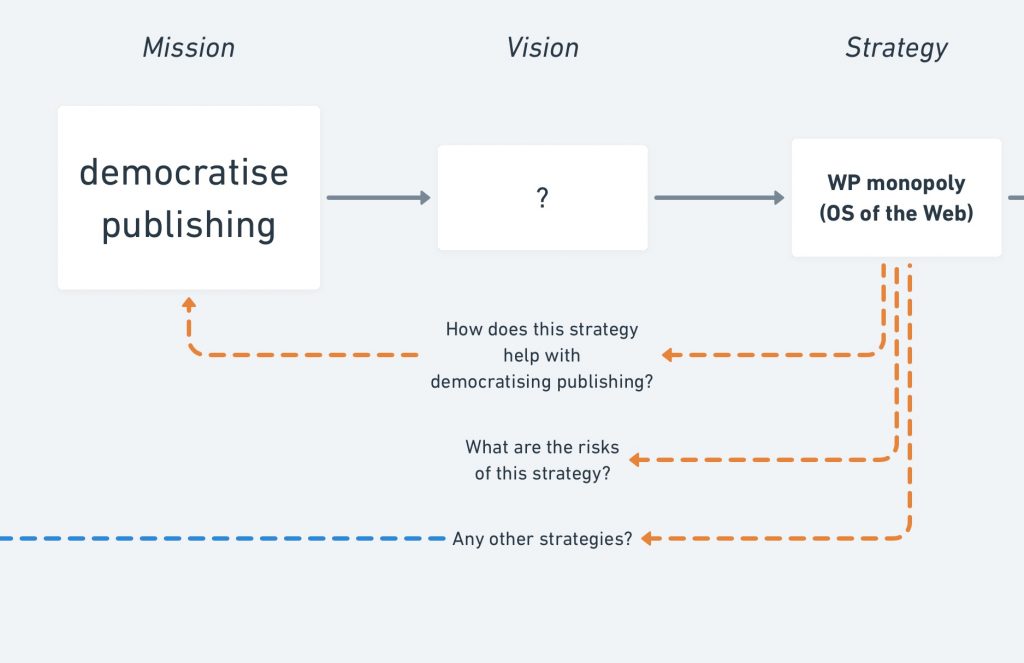
Again, the bare minimmum we have is a Vission to work with. Even in the absence of a Mission, there is another area which would help us keep our strategy in check: alternative strategies. What other plans help? What are the areas that our current strategy does not cover? What would be alternative strategies that compensate some of the risks of our primary one?
Let’s do a quick exercise of where our other strategies could come from, in absence of a Mission.
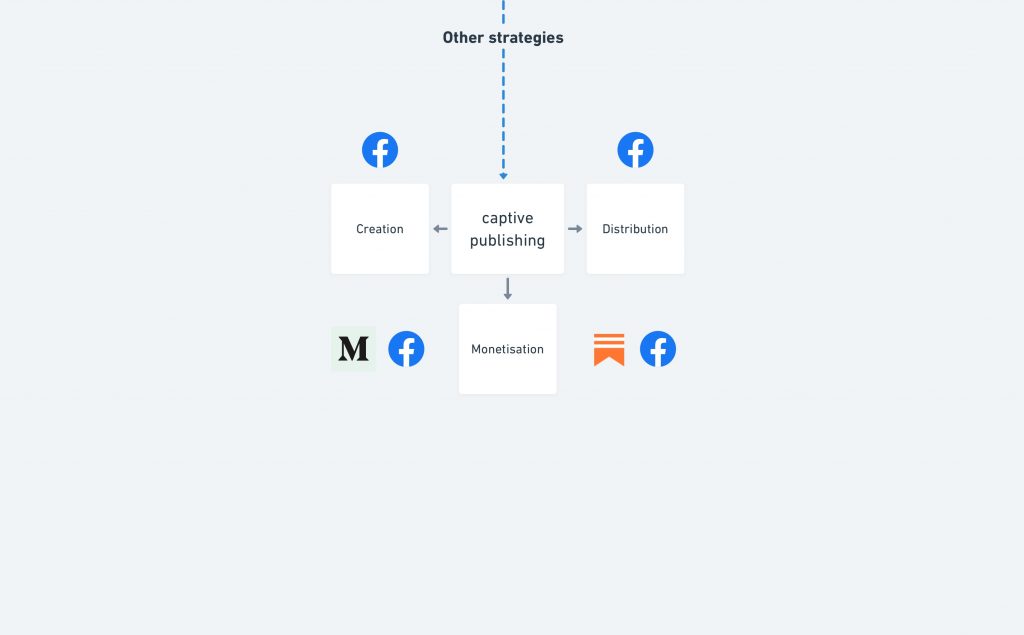
The state we start with, which we want to change, I like to call it captive publishing. Your creative output, sometimes your life’s work, sometimes your actual life, is in a walled garden. It is not yours, it is not portable, it depends on the rules, weaknesses and sometimes whims of the walled garden.
We can describe effective publishing as more than the act. Publishing is a far reaching activity: it has a creation phase, but to achieve some goals it also requires at least two more arms of direction: distribution and monetisation. All three arms are already occupied by at least Facebook. This platform is so big that it could eventually be placed in any of these things.
At the intersection of some publishing arms smaller players reside, e.g. Substack looking to solve monetisation and distribution in a simpler way, or Medium looking to solve the creation and monetisation in a simpler way. Sure, these are not thorrough analises of these companies, but the point is not to study competition, as much as to see how captive publishing is a phenomenon created by the competitive market itself, and that this is where WordPress wants to solve things for humans, as a non profit project.
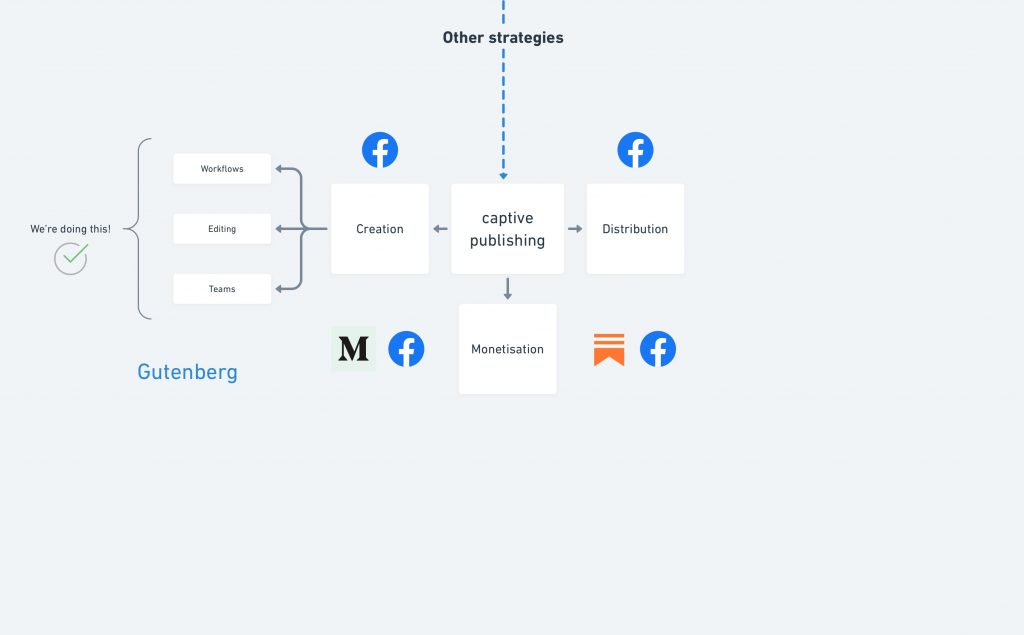
Currently, we’re advanced at solving the creation arm of publishing. It is not complete, it’s still ongoing work, but because we’re looking at a strategy of monopoly, hard onboarding, difficulty in effectively setting up a publishing tool based on WordPress is the big 80/20 that we can pick. So Gutenberg to the rescue. It will eventually solve a lot of problems:
- make it easier to start, look at the advancement of patterns and block themes,
- make it easier to customize your publishing space,
- the new tech stack allows us to try and implement collaborative editing,
- part of Gutenberg’s plans, I think, is to revamp how editorial workflows exist in WordPress.
So this is an arm where we’re actually winning. Having the impressive scores in pagespeed and bringing a beautiful UX model that is, for now, way ahead, in my opinion, of other products in terms of combining flexibility with ease of use, makes WordPress a very compelling choice. But what do we do next?
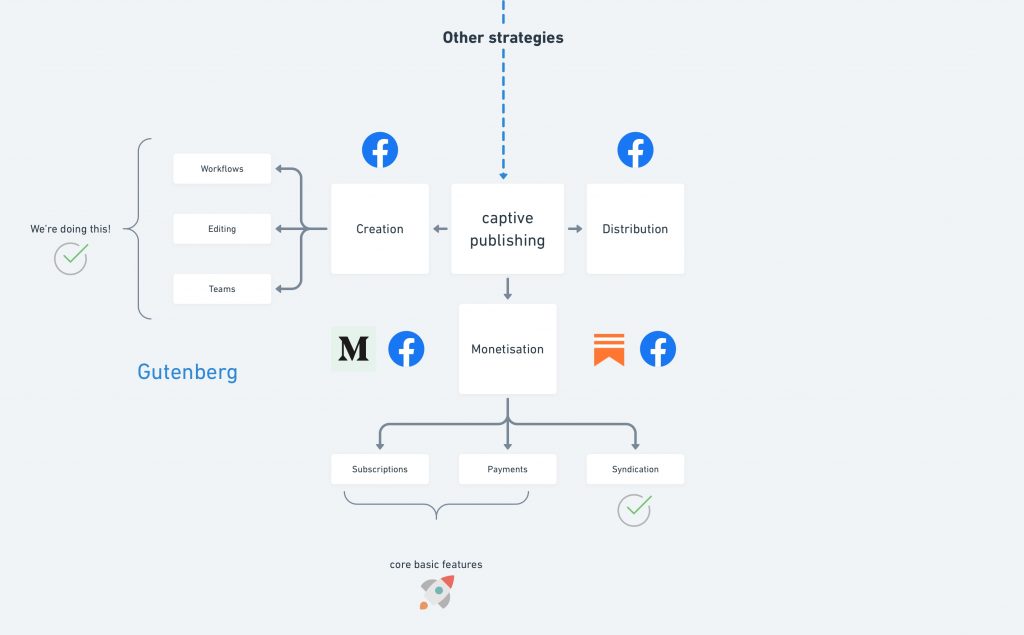
Not much. To monetise your publishing endeavor with WordPress you have to tap into an ecosystem that effectively creates another kind of captive publishing. There is a immensely steep learning curve to choose, setup and use the solutions. Then once you’re in, just like our old classic mega themes, you’re trapped in a system that effectively takes over your business. Hardly democratised. What else?
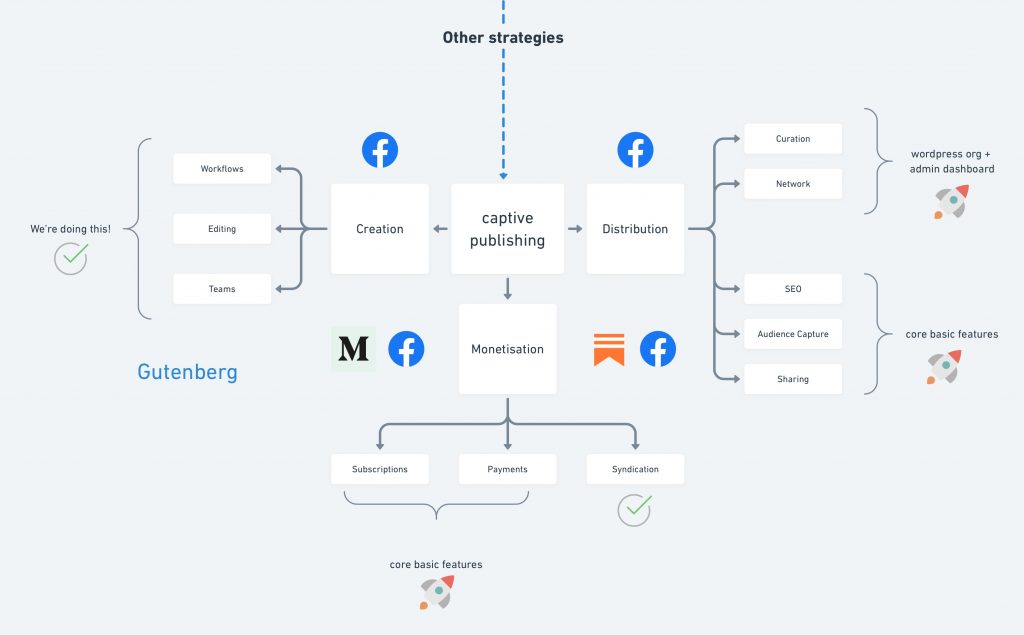
Still little to nothing. Distribution with WordPress is at the mercy of other internet Giants (publicize your publishing to other networks or wait for Google’s opaque alogrythm to send some divine traffic your way). Organic distribution in this decade is anywhere between dead and depending on extreme quality and reputation. Hardly democratic.
Even if you do manage to attract an audience, there is no way in WordPress to actually capture it, cultivate it and grow it. Except if you, like in the case of monetisation, tap into an ecosystem that in turn does the same: slowly but surely takes over and turns your freedom into captivity.
Caveat. We have an ecosystem. Won’t our ventures in these areas that are served by it estrange the ecosystem which is so valuable to WordPress?
Not if we do it according to our Vision, to democratise publishing. We don’t have to take over and solve all the problems in core. We need to make sure APIs exist, sysyems are in place, best practices are nudged into the ecosystem, sensible defaults exist, and basic options function for a publisher of this day and age are built in.
We seem to have forgotten, in my albeit narrow perspective, our own rules: if 80% of people start defaulting to some functionality fom plugins or theme options immediately after setting up a stock WordPress site, then that functionality should have a core representation of some kind. But I can’t build a mailing list in 2021 with stock WordPress, nor can I get a tip. I have to install a jugernaut of a plugin to get basic SEO improvements. I need to install a caching plugin to safeguard my publishing space from friends and family crashing it. That is a very barebones experience.
So what is there to be done?
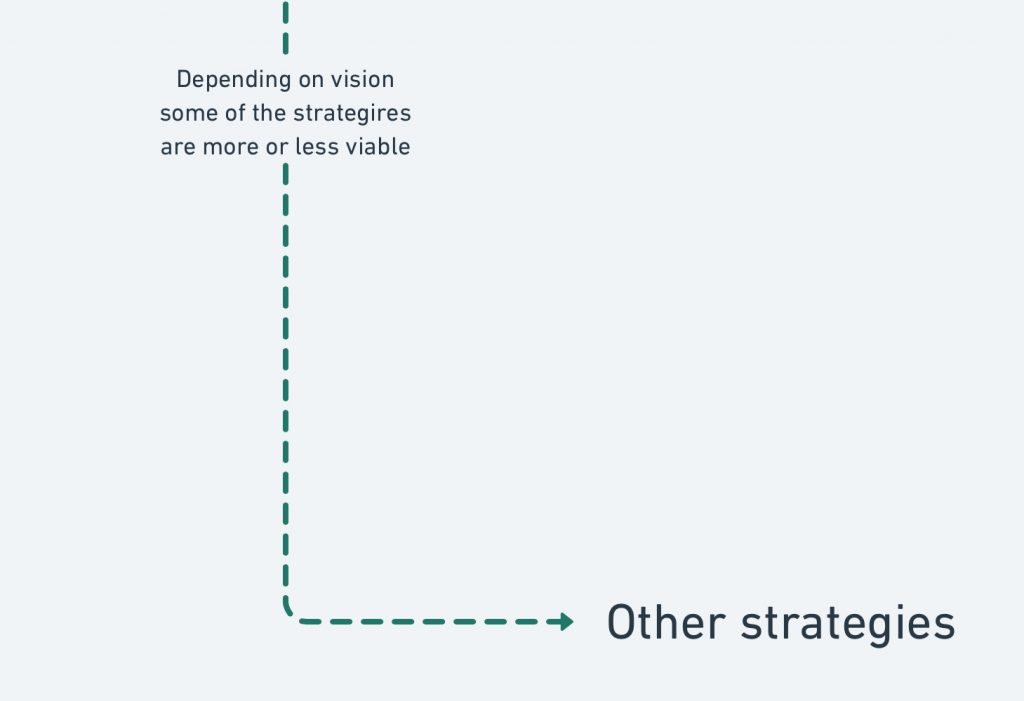
Continuing with our lack of a Mission, we can rely on our vision to devise new strategies, that could work along our primary, well meaning, monopolistic approach. We need to devise new ways to improve WordPress at allowing people to set themselves free and to not even need to start in a place where they deal with captive publishing.
Here are some basic ideas for alternative strategies:
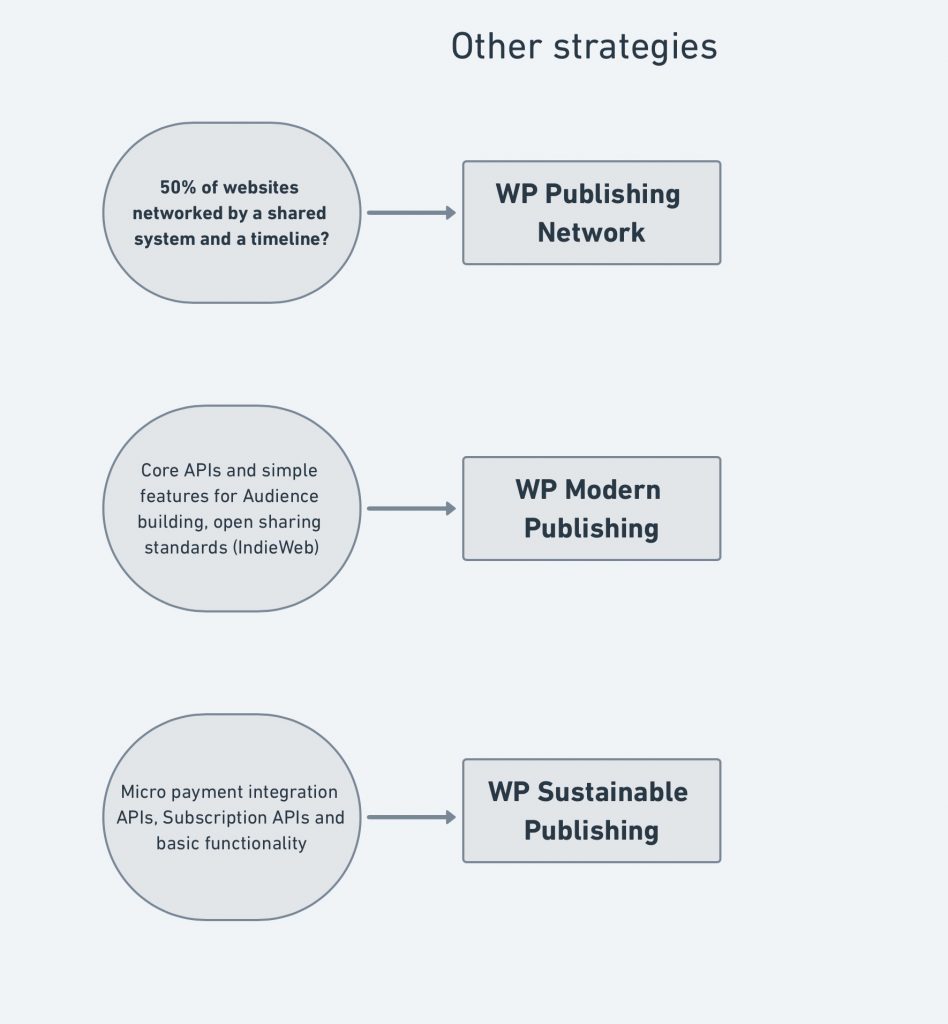
Just like our monopoly strategy, these strategies are also going to require their own objectives, goals, projects. Some will work, some won’t. Some are viable ideas, some lack the technology yet. A point of this exericise is to show that having multiple approaches to see our vision a reality is a better way than betting on one horse. These strategies can compensate for eachother’s risks. They create space for our vision to manifest.
The examples above are just a tiny set. For instance, we should have a strategy for the fact that the mobile space is deeply undemocratic. They’re all walled gardens. But our publishing models, based on an open web, are fragile now with two thirds of people experiencing the open and the closed web via a mobile device. Mobile publishing is waiting to burst and it may just mop the floor with the standard desktop ideas we have. All that is missing is better input tech. Voice was not what it was expected. Yet. Folding phones may be the trigger or Samsung’s desktop from a phone system may stick and everyone else start doing it. Who knows?
Nevertheless, while mobile publishing is important, it is rather a new-ish problem, with some unsolved foundations. On the other hand, distribution and monetisation issues with stock WordPress are old problems which are solved successfuly by players that effectively create a world diametrally opposed to our vision.
This is core’s job: to keep an eye on and to constantly shepherd strategies that advance our vision. While Gutenberg will itself tap into these, when time comes, today the bulk of “stock WordPress” and it’s potential to democratise publishing are all those core features which existed before Gutenberg, which are the foundation Gutenberg depends on and which will enable Gutenberg later to express its original vision. But the seeds and the fertile ground has to be in core by then.

Thanks for reding and giving this some thought. Here is the whole picture for perspective.